Writer and performer Khalid Abdalla bares his soul in his one-man play Nowhere, a searing exploration of European colonialism. He performed throughout October at Battersea Arts Centre, London, and HOME, Manchester.
Inspired by his own experiences, Abdalla weaves together a series of evolving narratives that demonstrate the inescapable prejudice, discrimination, and expectation of people of colour in a Western-centric world.
He exposes the reality of diasporic communities that have known oppressive systems. For many, existence is fraught with danger. As Abdalla has learnt, a body can be political before the person inhabiting it can choose the extent of their involvement.
And yet as he moves across this delicate gossamer, for some inexplicable reason, there is always a glistening of hope.
What is certain from the moment Abdalla begins to speak is this: he feels a great responsibility to challenge and change society’s lazy, habitual norms. This is a web to which we all belong, and it’s high time we acknowledge that.
“This nowhere is safe. But there are places in the world where nowhere is safe.” Abdalla navigates the meaning of place with thoughtful wordplay and an immediate nod to the show’s ambiguous title. His introductory monologue is provocative, not hesitating to submerge his audience into the nuance of an identity that must be fought for.
As the concept of place and identity progresses, momentum builds and Abdalla uses the speed and sincerity of his voice to unnerve the room.
“When the unbearable becomes persistent, where do you go?” Abdalla searches the theatre for an answer no one can provide.
He recalls the story of The Flood – a mythology which appears in monotheistic religion the world over, and in almost every ancient oral history from Celtic to Norse to Egyptian.
And then, black.
With the room tense, every mouth silent and every mind compelled Abdalla plunges his audience into 2011. Riot noises echo around the auditorium and Abdalla screens a piece of paper with an Arabic scrawl behind him via a visualiser. He begins to track the route to the 25 January Revolution which saw Cairo erupt with acts of civil resistance and an uprising spread across Egypt with a collective intention to overthrow Egyptian President Hosni Mubarak.
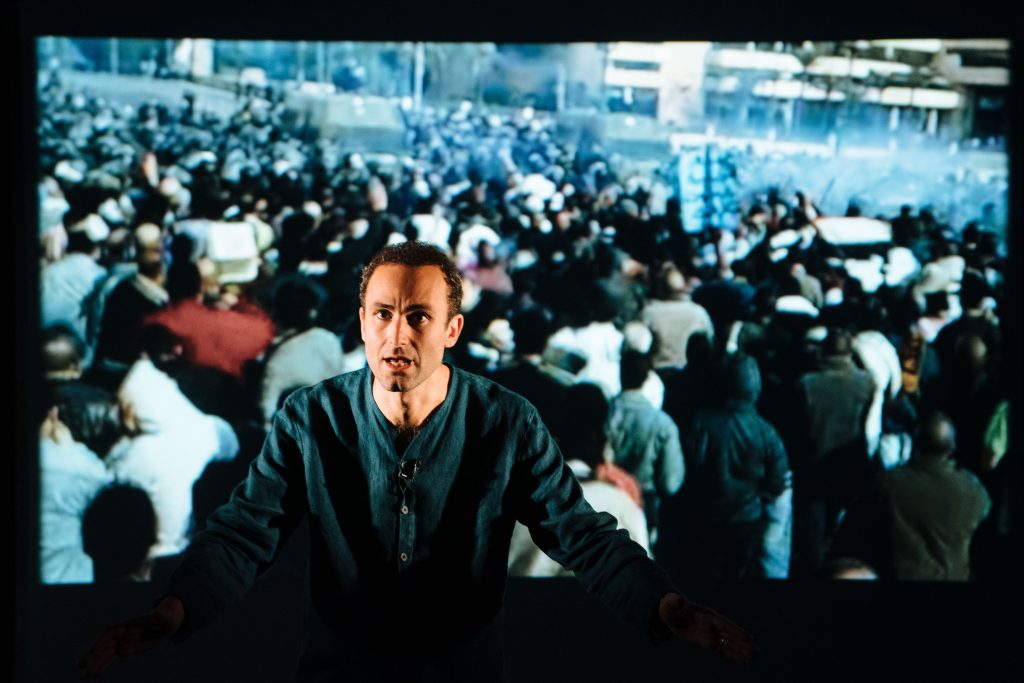
“Then came the call,” Abdalla tells us. “My body was aching to be back in Cairo.”
And so, Abdalla reveals how and why a person might find themselves in the maelstrom of a revolution that demands answers from its leaders, attention from its neighbours and democracy for its people.
Over the next 80 minutes, Abdalla examines how his ancestral homeland Egypt, and the Arab world, came to be under perpetual suspicion on account of a face and a name. He recounts experiences of casting directors, customs, and red carpet walks in which the white west has judged his intention and even his English before he’s given a moment to introduce himself – in his classically RP English accent.
But among the struggle to exist in any reasonable expectation of peace, there is light. Perhaps the most pertinent focus of Abdalla’s captivating commentary is that of friendship, and by that token, grief.
Underpinning every artistic choice Abdalla makes in this piece is an intention to equate every human experience. Regardless of the social hierarchies which hold us, and those upheld by many of us, there is a person who loves and is loved. If only we’d value that over this rampant hunger for power, we might come to know true humanity, Abdalla seems to imply.
Moving from the meta to the macro, Abdalla is introspective. He traces the roots of his parents and grandparents, he considers the impact of their lives on his, and the impact of his life upon his children. He celebrates. He loses himself in the highs of joy. It is this that makes his lows even darker.
And Abdalla confronts head-on the political history that has affected the need to conduct this exploration. Alongside footage Abdalla shares of his life which includes his participation in the Egyptian revolution, time spent with friends and family, and old home videos from his childhood, he shares the faces of powerful people who’ve inflicted chaos without conscience. Thatcher, Reagan, Bush Sr and Bush Jr are among those we see, and soon Osama Bin Laden and various autocratic leaders from across the Middle East.
All of this is presented with the sound of club classics like Rhythm of the Night, and haunting remixes including one of I Put a Spell on You. Abdalla is mesmerising as he uses his physicality to tell much of the story through movement and dance that emulates conflict, puppetry, and terror. At points, he uses a gauze to create distance between himself and the audience, almost as if there is a realm we can see but cannot access. He plays with shadows and silhouettes frequently. And the use of light guides the atmosphere from uncertainty to devastation, to enlightenment.
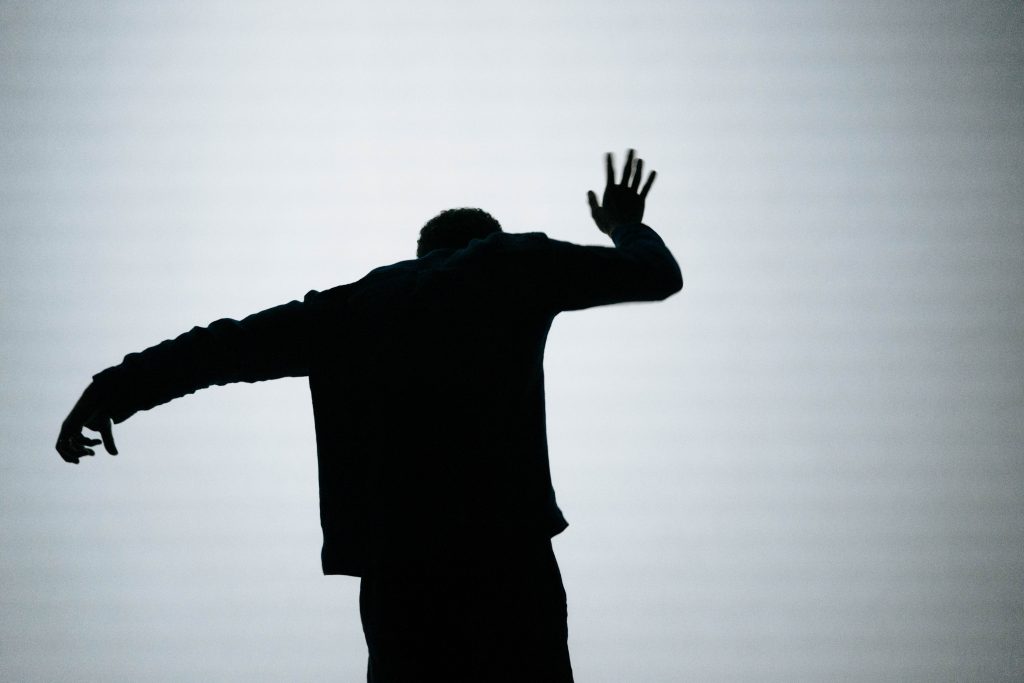
There are moments in which Abdalla calls upon the audience to interact with him. He asks the audience to stamp their feet in response to questions about whether their parents were born inside or outside the UK, if they’d known anyone who’d been to prison, or if they’d been themselves. There was a staggering silence when Abdalla asked if anyone loved the current government.
“The ground beneath our feet belongs to all of us.” Abdalla asserts from within the audience as a charming photograph of his parents at Trafalgar Square in 1974 circulates. “While we have one body, we are not one body.” He muses before lying on the ground surrounded by visuals and the sound of the sea – an image with stark connotations to the refugee crisis that it’s impossible not to see.
Abdalla has created something tremendously powerful. He captivates, stimulates and encourages reflection as within, so without. This is a triumph of theatre, but more importantly, it is an urgent call for the defence of humanity awaiting a cry back. The question is: are we ready for change?
A few tickets are remaining for the two final performances of Nowhere at HOME Manchester here.
All image credits: Helen Murray
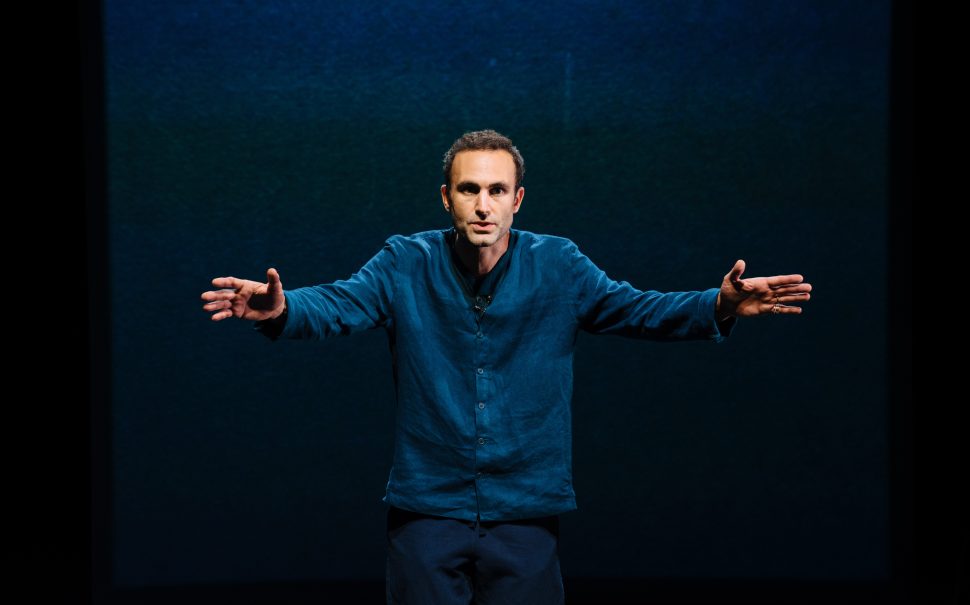
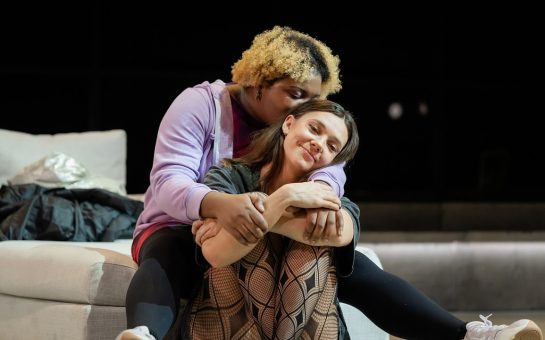
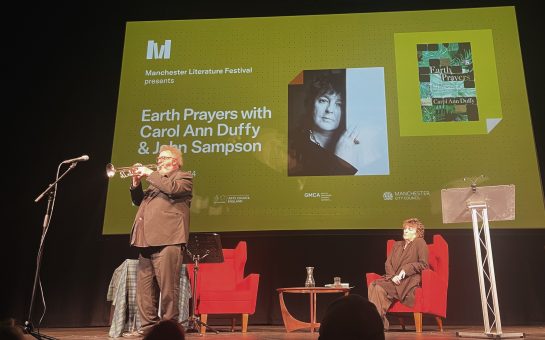
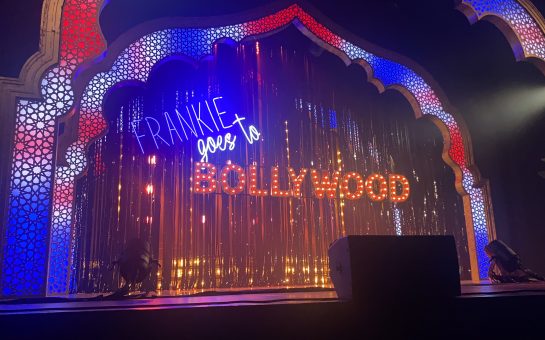
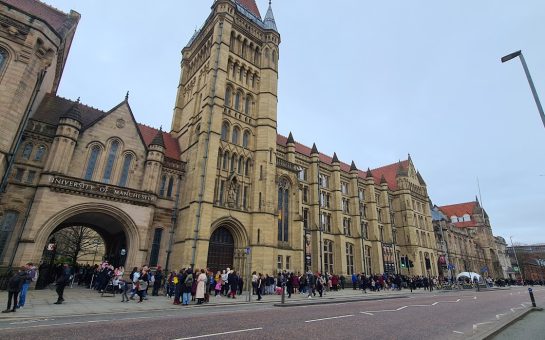
Join the discussion
This was unbelievably powerful! I feel it needs to be seen all over the country – not just in London and Manchester! If anyone knows how to contact Khalid Abdalla, PLEASE tell him he needs to take his amazing performance of Nowhere to as many other places as he can!